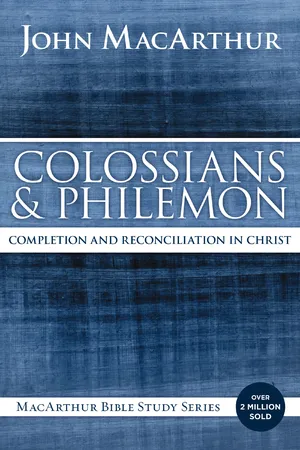
- 128 pages
- English
- ePUB (mobile friendly)
- Available on iOS & Android
About this book
The early church dealt with the same threats from false teachers that today's Christians face. Pastor John MacArthur will take you through Colossians and the short letter to Philemon, passage by passage, so that you can better understand Paul's arguments and how they apply to us today.
When Paul learned about the dangers the church was facing, he wrote them a message of warning. Colossians is full of dramatic and powerful passages coupled with rich instructions that defend Christ's deity and His sufficiency to reconcile men to God. Paul's message is a reminder that believers—then and now—are complete in Christ.
Paul also wrote a personal letter to Philemon, a prominent member of the Colossian church. This letter urges Philemon to forgive a former slave and thief and welcome him back as a brother in Christ. Through this real-life situation, Paul teaches Philemon, as well as believers today, the importance of forgiveness.
—ABOUT THE SERIES—
The MacArthur Bible Study series is designed to help you study the Word of God with guidance from widely respected pastor and author John MacArthur. Each guide provides intriguing examinations of the whole of Scripture by examining its parts and incorporates:
- Extensive, but straight-forward commentary on the text.
- Detailed observations on overriding themes, timelines, history, and context.
- Word and phrase studies to help you unlock the broader meaning and apply it to your life.
- Probing, interactive questions with plenty of space to write down your response and thoughts.
Frequently asked questions
- Essential is ideal for learners and professionals who enjoy exploring a wide range of subjects. Access the Essential Library with 800,000+ trusted titles and best-sellers across business, personal growth, and the humanities. Includes unlimited reading time and Standard Read Aloud voice.
- Complete: Perfect for advanced learners and researchers needing full, unrestricted access. Unlock 1.4M+ books across hundreds of subjects, including academic and specialized titles. The Complete Plan also includes advanced features like Premium Read Aloud and Research Assistant.
Please note we cannot support devices running on iOS 13 and Android 7 or earlier. Learn more about using the app.
Information
1
THE GOSPEL TRUTH
Colossians 1:1–8
DRAWING NEAR
THE CONTEXT
KEYS TO THE TEXT
UNLEASHING THE TEXT
GOING DEEPER
EXPLORING THE MEANING
Table of contents
- Cover Page
- Title Page
- Copyright Page
- Ebook Instructions
- Contents
- Introduction to Colossians
- 1. The Gospel Truth: Colossians 1:1–8
- 2. Paul Prays for the Colossians: Colossians 1:9–14
- 3. Christ’s Preeminence: Colossians 1:15–23
- 4. Paul’s View of Ministry: Colossians 1:24–29
- 5. Christ Over Philosophies: Colossians 2:1–10
- 6. Christ Over Legalism: Colossians 2:11–23
- 7. Christian Conduct: Colossians 3:1–17
- 8. The Christian Home: Colossians 3:18–21
- 9. Masters and Slaves: Colossians 3:22–4:1
- 10. The Speech of the New Man: Colossians 4:2–6
- 11. With a Little Help from My Friends: Colossians 4:7–18
- Introduction to Philemon
- 12. The Power of Forgiveness: Philemon 1–25